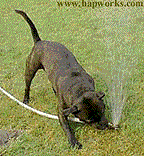WE REALISE THAT MOST OF THE PROBLEM IS IN AMERICA AND ITS THERE THAT NEEDS THE MOST SUPPORT TO STOP BSL BUT IT HAS STARTED HERE IN THE UK AS WELL (PLEASE READ BLOG TO FIND OUT WHY)! WE NEED ALL THE SUPPORT WE CAN GET! THANK YOU!
A small, stocky, powerful dog of a breed developed in England by crossing bulldogs and terriers, having a short, variously colored coat, a broad head with dropped ears, a short muscular neck, and widely set forelegs. The Staffie is a breed that has many supporters and perhaps just as many detractors. Over the generations the Staffie has put his fighting history behind him and his other famous trait, as a loving family member, has earned him a place in the hearts of many. Staffie owners recommend their dogs as confident, people-loving dogs. A typical staffie is energetic, devoted to his families, and normally loves meeting strangers. In cases of reported attacks, there is often little distinction made between the bull terrier breeds, such as the American Staffordshire Terrier, the Pit-Bull Terrier, the Bull Terrier and the Staffie. Perhaps because of its comparative high numbers and poor recognition by the public, the Staffie wears much of the blame for reported attacks that may have been perpetrated by any member of the bull terrier breeds. The Staffie is renowned for its reliability as a family dog. They are extremely loving dogs, being loyal and devoted to man, with special emphasis on their reliability with children. The breed thrives in the family environment, being a suitably compact size for close family living.
A strong muscular terrier of an American breed with powerful jaws, a broad skull, and short hair, originally developed for dogfighting.
Pit bulls have gained a fearsome reputation among the general public due to negative media attention, but those familiar with the breed generally attest to its friendly disposition, especially toward children and small animals, earning it the nickname "the nanny dog".
Breed supporters point out that pit bulls make good family pets, showing loyalty, playfulness, and a desire to please people. They also claim that most pit bull animals are no more or less likely to be aggressive than any other large domesticated dog. In fact many dog fancying websites and humane societies recommend "pit bull" type dogs as family pets because of their stable temperament, high pain tolerance, and desire to please people. However, because of their physical attributes and the social stigmatization surrounding them, the pit bull seems to be a popular choice among unsavoury owners. Those who primarily want an animal to fight or to intimidate do not properly train or socialize their dogs and are mostly responsible for the negative stereotype of the "pit bull" in today’s society.
For the full list of "Bully Breeds" please visit http://www.bulldogbreeds.com/ and find out more!
